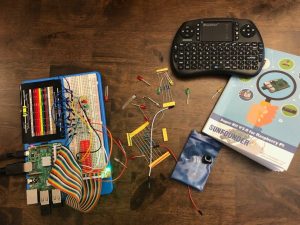
In a thread on twitter by @Ennyraquel, she highlights two important issues in the Nigerian secondary education sector. She tweeted about how some secondary school students that were candidates in the recent JAMB examinations were not able to independently make use of their computer’s keyboard during the examination; you can read the whole thread on her Twitter page by double-clicking on the tweet below:
They cannot left click, they cannot pick their answers using the mouse or the keyboard, they cannot scroll, they cannot delete when they make a mistake, they cannot locate letters on the keyboard
— Eniolaoluwa (@Ennyraquel) April 17, 2019
In the thread, @Ennyraquel emphasises two fundamental issues:
- Poor literacy skills of the students
- Lack of basic computing (ICT) skills of the students
In this post I would like to focus mainly on the lack of computing (ICT) skills of the students and according to International ICT Literacy Panel (2002, p. 2) (PDF) definition cited by UNESCO that “ICT literacy is using digital technology, communications tools, and/or networks to access, manage, integrate, evaluate, and create information in order to function in a knowledge society.” Hence, one can safely say that ICT literacy is a subset of general literacy in a digital world.
Firstly, it is important to note that Information Technology (IT) is mentioned in the country’s National Policy on Education 2013. Likewise, IT is recognised as an essential part of the country’s education system and provision, and to this effect the Policy in Section 29 states that:
In recognition of the prominent role of Information Technology (IT) in advancing knowledge and skills necessary for effective functioning in a knowledge driven world, government shall provide adequate infrastructure and develop capacity for effective utilization of Information Technology (IT) to enhance the delivery of Basic Education in Nigeria.
Secondly, the Policy in Section 151(iv) states that:
The goals of assessment shall be to: eliminate the intractable problems associated with the traditional Paper Pencil Test (PPT)
And in Section 152(c) it states that:
All levels of education in Nigeria shall be encouraged to migrate to Computer Based Test (CBT) in assessment.
However, in what seems to be an attempt to exonerate itself from the mandatory provision of IT education in the country’s compulsory education sector, the government use “encouraged” in Section 152. But embedding, integrating or delivering ICT education in the public education sector would not happen in a vacuum, and without the necessary investment by government on: infrastructure, equipment, security, training and curriculum, the whole ICT agenda as espoused in the National Policy on Education 2013 would remain a mirage or at best an optical illusion.
Although, it is not enough for the government to just throw money at the issue and expect it to be resolved. There is need for conscientious efforts on the parts of the major stakeholders in the education sector to address the problem, and without government championing the cause and providing enabling environment and incentives for learning in the 21st century, the issue will remain a problem. So, to address the issue of lack of ICT skills among secondary school students in the country, I would suggest the government roll out a nationwide sustainable ICT programme that will include:
- A comprehensive ICT curriculum that is skills focused and enabling
- A comprehensive ICT training or professional development programme as part of teachers’ mandatory continuing professional development
- Provide schools with, at least, small and affordable computers like Raspberry Pi
- Fund school-based STEM clubs
- Establish a similar project like the National Home Grown School Feeding Programme; only that in this instance the “cooks” will be the independent but registered SME ICT firms
- Encourage examination bodies like JAMB to continue to invest in making ICT accessible to all their candidates
- Provide the much needed electricity to power the computers
Lastly, I have to acknowledge that in the last quarter of 2018 it was announced in the national news that 1.5m Students to Get IT Training as FG Partners Oracle; let’s hope the project will come to fruition and that it will be the beginning of similar projects by the Federal Government.